
Indies Recommend: 10 Small Press Books You Should Read Right Now
Iowa City's Praire Lights Picks Its Favorite SPD Titles
As the nation’s only non-profit distributor, Small Press Distribution is dedicated to getting small press literature to the people who want to read it. As such, we’re grateful to our main customers—indie bookstores—the outward-facing purveyors who present our books to the public with flair and aplomb. To celebrate the great individuality of our favorite indie stores across the country, SPD’s asked a few of them to shine a monthly spotlight on their ten all-time favorite SPD-distributed titles. This month, we’re excited to host Iowa City bookstore Prairie Lights.
Prairie Lights is an independent bookstore in Iowa City, Iowa that has catered to the literary community here since 1978. In the heart of downtown, our 11,000 square foot space features a large fiction and poetry section on the main floor, a full floor of children’s books, and a lively cafe. Our reading space on the second floor can accommodate up to 150 people, and we hold readings approximately five nights per week. Our funny and literate staff of 37 are all wonderful hand-sellers who learned at the feet of the renowned Paul Ingram. The thriving culture of writing and reading in Iowa City—now a UNESCO City of Literature—is the foundation for the vitality of Prairie Lights.
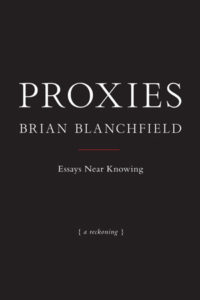
Brian Blanchfield, Proxies: Essays Near Knowing
(Nightboat Books, 2016)
The poet Brian Blanchfield writes essays from memory, each seemingly on one subject: house-sitting or frottage, say. These meandering essays leave and return to their subjects; they are and are not messy memory; house-sitting becomes about privilege and art; frottage about the terror of aids in the eighties. Blanchfield writes freely without fact checking, but not without reverence to the facts. The world of mis-remembered fact leads to a conversation about wider truths. Plus, for any repentant truth seeker, there are pages of “Correction” in the back.
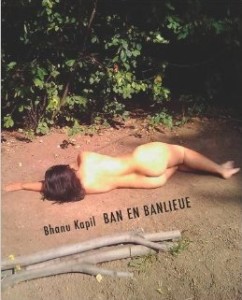
Bhanu Kapil, Ban en Banlieue
(Nightboat Books, 2015)
Another powerful present from Nightboat Books, Bhanu Kapil’s poems follow one young woman, Ban, who walks alone as a race riot in a U.K. suburb rages around her. Ban’s story is also that of any woman brutalized by men of power. To encounter this world is to resurrect those women. Kapil has created a new, and beautiful, language of violence and pain.
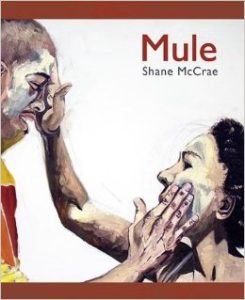
Shane McCrae, Mule
(Cleveland State Press, 2011)
These poems are about the you or I in plural, relationships that formed or that lasted or didn’t last. In pointed verse, Shane McCrae stabs at the perceptions and the imposed dichotomies of race, the violence of being, and the mirroring of the self. This is McCrae’s first book from 2011, but it doesn’t feel aged a day.
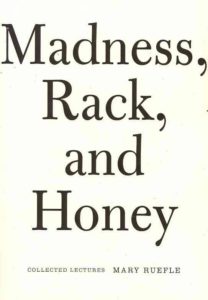
Mary Ruefle, Madness, Rack, and Honey
(Wave Books, 2012)
We suggest that every one of Mary Ruefle’s books belongs on your bookshelf. These collected lectures are, simply put, about poetry and art. They are also about the ways that Ruefle engages with poetry, writers, and philosophy. Her writing on secrecy is as urgent as her essays on sentimentality. Perhaps you should buy this book as a present to yourself. Everyone else already has.
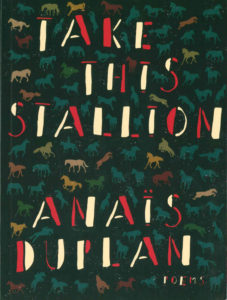
Anais Duplan, Take This Stallion
(Brooklyn Arts Press, 2016)
Finding Take this Stallion on the shelf is like finding a bright coin on a grey day. It’s perfect reading to cut through any fatigue cloud or lingering winter. Anais Duplan’s poems and rhythmic language explore the “I” as much as they engage persona with race, pop culture, music, relationships, physicality, and mourning. Duplan, born in Haiti and living in Iowa, asks the questions of youth with the confidence of a much advanced poet. We can’t wait to see what’s next.
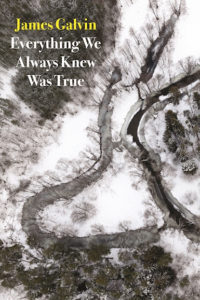
James Galvin, Everything We Always Knew Was True
(Copper Canyon)
James Galvin’s poems are characterized by an ever-inventive, closely-honed prosody and vast store of imagery that is the result of a lifetime of real reading. They are distinguished by a personal surrealism that is tempered by—or born out of—an American realism. They are sure in a world that will never be sure.
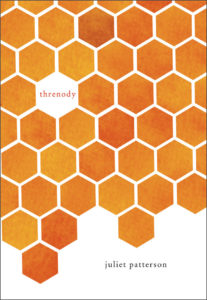
Juliet Patterson, Threnody
(Nightboat Books, 2016)
Juliet Patterson’s beautiful new collection is a lyric lament for the world we know and have known. Written over a number of years, it seems to have been born into a time so in need of it that to read it is eerie. Patterson’s ear and imagery are always in synch. She sees what is here in all its haunting fragility. “Flowers through snow / show survival’s grimace.” And yet, “all things / rejoice / in the age to come.”
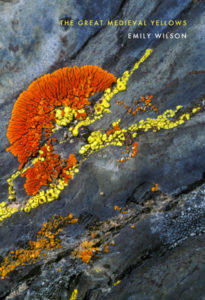
Emily Wilson, The Great Medieval Yellows
(Canarium Books, 2015)
The Great Medieval Yellows describes the natural world at such close range that the self—the eye—becomes microscopic as the view is enlarged. Emily Wilson’s sense of sound is as precise as her vision. It is as if the English language were made for her, as the Latinate and the Anglo-Saxon converge in a syntax perfectly suited to her vision. The cogent precision of these poems allows us to merge with the world in an empathic moment that is eerily thrilling.
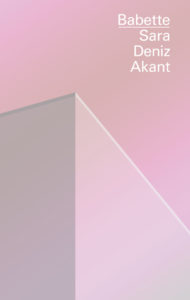
Sara Deniz Akant, Babette
(Rescue Press, 2015)
Sara Deniz Akant creates a sense of enticing danger into which we glimpse cautiously, demanding work from our imaginations to fill in the remaining space. Reading Babette is a journey into a dimension in which each syllable and image leads you to the next, all while the character of Babette looms in and out of focus. Selected as the winner of Rescue Press’s Black Box Poetry prize by Maggie Nelson, this book is very much deserving.



















